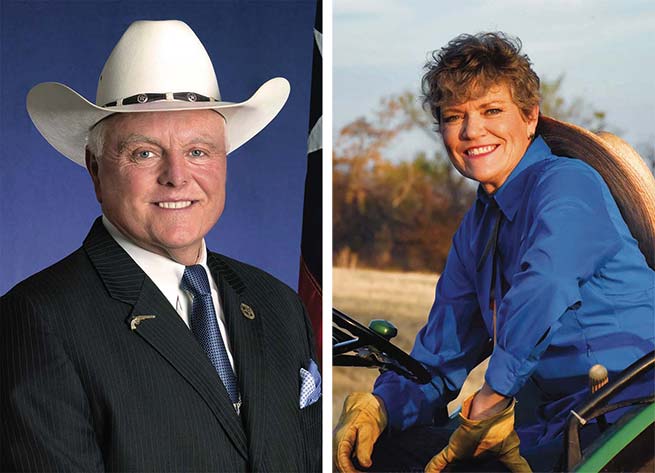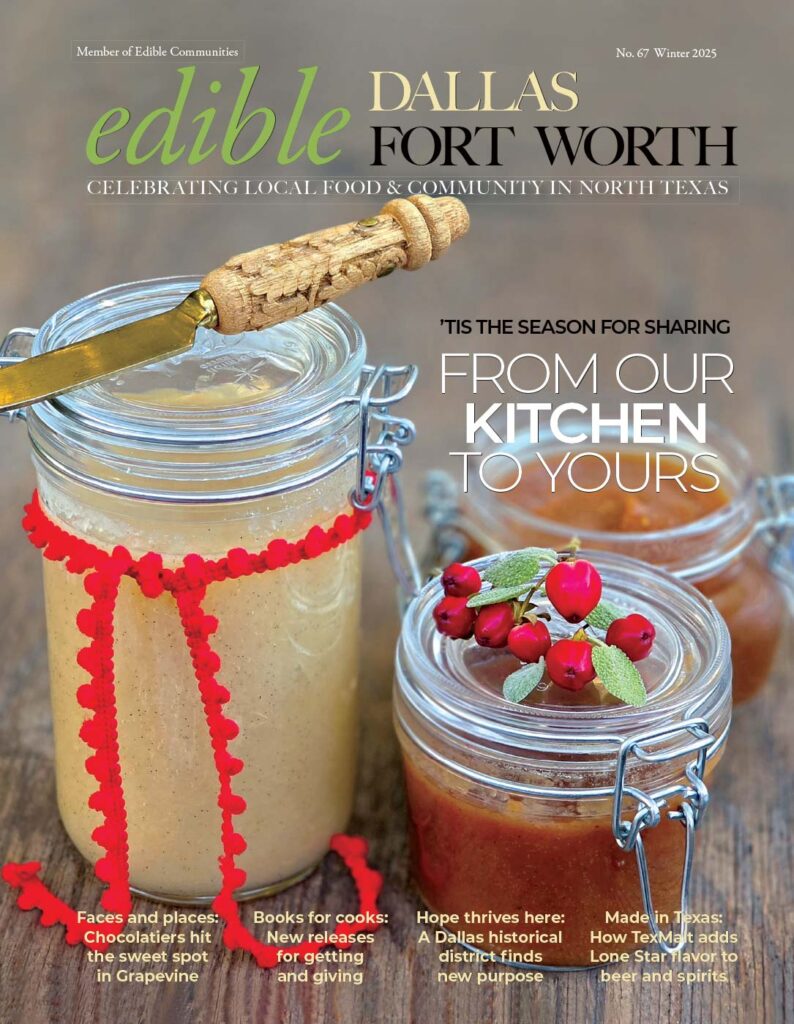Learn About Our Texas Ag Contenders

In November, Democrat Kim Olson will challenge Republican incumbent Sid Miller in the race for Texas Agriculture Commissioner. It’s an office that uniquely affects areas of interest to Edible Dallas & Fort Worth readers: clean, locally and sustainably grown fruits, vegetables, meat and dairy, as well as Texas wines, artisan foods and farmers markets.
What does the ag commissioner do? He or she oversees the Texas Department of Agriculture, which has broad regulatory and marketing responsibilities, from developing the Texas agribusiness industry to regulating pesticides and herbicides. TDA runs the GO TEXAN program and works closely with farmers (which includes wine-grape growers), ranchers, craft beer producers and farmers markets.
We sent both candidates the identical questionnaire, asking what they would do going forward to promote and support those areas of interest to readers, especially as concerns the consumer-interface GO TEXAN program.
Read on for what they said.
What are your top three priorities at TDA going forward?
Miller: (1) To continue our school nutrition reforms including the “Farm to School” initiative, “Farm Fresh Fridays,” and the promotion of the use of locally sourced produce. Just last year, as a part of TDA’s “Farm Fresh” program, Texas schools purchased an additional $30 million dollars of Texas-sourced produce. We want to double that amount next year. (2) To expand and improve the GO TEXAN program to include highlighting value-added, Texas-manufactured products as well as Texas-production agriculture products (food and fiber). (3) To continue to create, open and expand global markets for Texas agricultural producers. Currently, Texas leads the world in the production of food and fiber products. Under my leadership, the TDA has placed a new focus on marketing Texas products. Since my election, my TDA team has visited every continent in the world (except Antarctica) with the purpose of creating and expanding markets for Texas agriculture products.
Olson: My overall policy priorities are specific to land preservation and water conservation; jobs and the economy; healthy families and communities; and marketing support for Texas farmers, ranchers, and food producers. As for my top three priorities for the office— from day one I will focus on returning credibility and respectability to the office of Texas Ag Commissioner to ensure a good working relationship with legislators. Second, I will strengthen connections with partners in Texas and from other states so our combined voices can elevate this message: Ag is important to our national security and should not be used as a pawn in some ill-informed trade war. Third, I have two words: broadband internet. Our rural communities and agricultural producers need access to high-speed internet for education, business operations and opportunities, economic development, and even health care.
What is a farmers market? Should it be TDA’s responsibility to regulate farmers markets?
Miller: Farmers markets are a gathering of small, local agriculture producers who have come together for the purpose of showcasing, marketing and selling their goods. TDA does not and should not regulate farmers markets in Texas, but rather we partner with them and certify them through our GO TEXAN program—not only to help promote them, but to help ensure that consumers can be assured of the quality, freshness and origin of the products sold there.
Olson: TDA has a dual function in agriculture—regulation and marketing. Farmers, ranchers and other food producers who incorporate direct-to-consumer sales into their marketing plans do not need more regulation. Neither do the farmers markets where they sell. Farmers markets and their vendors would benefit more from TDA’s promotions role. TDA can educate consumers about the benefits of buying locally, help access programs that strengthen local markets such as the Local Food Promotion Program, and promote the establishment of regional processing and distribution facilities. Farmers markets are a place where rural producers and urban consumers can come together in a mutually beneficial relationship. There is a range of local definitions—some allow farmers to sell only the produce that they grow, others let farmers sell for each other, and others are open to reselling without regard for the origin of the product. Farmers markets are responsible for setting their own rules and making those transparent to farmers and to customers, so they can choose which markets they support.
TDA currently has a program to certify farmers markets. Going forward, who will oversee whether an applicant qualifies?
Miller: The Texas Department of Agriculture enjoys an excellent track record of working with our state’s many farmers markets. The TDA will continue to promote and assist farmers markets and their customers achieve their goals by helping advertise, promote and encourage Texas consumers to utilize them.
Olson: Certification of farmers markets will remain a role of TDA marketing staff. We will seek input from key stakeholders—market operators, farmers, and our staff—as to whether the qualifications are appropriate for the program to fulfill its purpose. The certification of markets allows them to operate under specific health department guidelines and allows those markets to build a customer base through such efforts as SNAP promotions and the Farmers Market Nutrition Program.
Texas’ small fruit-and-vegetable growers fall under the “specialty crop” classification in trade agreements. How will you work with Secretary of Agriculture Sonny Perdue to ensure those growers a fair shake as the North American Free Trade Agreement is renegotiated?
Miller: I represent the state of Texas at the Tri-National Agriculture Accord, where we deal with NAFTA and other trade-related issues. I enjoy a close working relationship with … Secretary Perdue and President (Donald) Trump. In fact, I was the co-founder of the president’s Agriculture Advisory Council, and I continue to brief the administration regularly on trade and agriculture-related issues. I will continue to work with Secretary Perdue and President Trump to ensure that Texas Ag producers are treated fairly through NAFTA and other trade agreements around the world.
Olson: I’ve said many times that I will run the department like I’ve run my campaign, which is based on listening to the folks on the ground who may be affected by a particular policy or practice. We are hearing support for open markets, so that Texas growers can market their crops across borders. But, we also plan to do what we can to help specialty-crop growers in Texas be more competitive. This includes advocating for immigration reform to address the labor shortage, using Specialty Crop Block Grants for promotions and market development, and promoting Texas products locally and beyond. There may still be a need to work together with our trading partners to implement protections for some crops or growers, but any solutions should be developed collaboratively, when possible, or at least diplomatically.
Currently, the popular GO TEXAN label may be applied to any Texas food producer, no matter where its ingredients come from. California olive oil bottled in Texas can carry the GO TEXAN label. Would you consider developing a separate program to identify products whose ingredients are largely sourced in Texas?
Miller: The GO TEXAN certification mark identifies products that have been grown, processed or manufactured in Texas. Some commodity and industry groups have decided on clarifying rules for their products, which TDA honors. Our goal is to ensure that all GO TEXAN products are labeled appropriately.
Olson: Promoting local foods is one of my main platform issues. A separate program for products may not be needed. I believe we do need to update the GO TEXAN promotion program to strengthen the meaning of the brand, expand its online and social media presence, and further support members in use of the brand.

Illustration: istock.com/FrankRamspott
Restaurants may display the GO TEXAN emblem if they serve “locally produced items—from shrimp to wine to seasonal vegetables,” according to the TDA website. Can you explain how a McDonald’s fast-food restaurant and Rick’s Chophouse in McKinney both qualify for inclusion? What would you do to give the designation greater credibility?
Miller: Restaurants join GO TEXAN as associate members and by doing so they promote and feature Texas-sourced products. We encourage all Texas restaurants to join GO TEXAN and to help support locally sourced ag products on their menus.
Olson: The current requirement to receive the GO TEXAN designation is to fill out a form. There is no verification and no documentation, but these days folks want to follow the “trust but verify” dictum. My department’s work will focus on both strengthening the meaning of the brand and increasing its value to those who qualify.
What would you do to specifically promote and support the flourishing Texas wine and craft beer industries?
Miller: My team and I at TDA already work closely with both the Texas wine and craft beer industries and help promote their products both here in Texas and around the world. We have created a number of initiatives to help achieve that goal. They include the creation of a Blue Ribbon GO TEXAN Wine Selection at the State Fair of Texas, the development and promotion of Texas Wine Trails, the creation of the Commissioner’s Award for the highest-scoring wine at the Houston Livestock Show and Rodeo, and advertising Texas wine and craft beer through various media channels. The Texas wine industry is supportive of our efforts and recently presented me with their highest award—the first time this award has been given to an elected official.
Olson: There are several common elements of these industries— procuring raw ingredients, processing the product, marketing and promotions, and distribution and sales. As both industries in Texas continue to develop, TDA has a role in supporting those farmers who can supply the ingredients that can be produced in Texas. We will also continue our marketing partnership, and seek out ways to expand those efforts. As for distribution and sales, I need to hear from the producers themselves, so I can learn exactly what barriers are currently in place that may prevent them from reaching their markets. In this age of reducing regulatory restrictions, I believe there should be support for removing those hurdles on behalf of small business in Texas.
In 2017, the wine industry in Texas contributed $13.1 billion to the state’s economy, according to a highly regarded WineAmerica study. How would you upgrade the GO TEXAN wine website? This might include an easy-to-use mobile app to reach tech-savvy wine drinkers and updating wine trail information (such as incorporating the data from the summer 2017 joint TDA-Edible DFW project) to promote wine tourism.
Miller: We at TDA are constantly looking for new and innovative ways to promote Texas wine. In addition to our GO TEXAN efforts, we have recently launched a Texas-wine-specific website called “Uncork Texas Wines” (uncorktexaswines.com) which is intended to promote and highlight outstanding Texas wineries, wine tours and tastings, and suggest wine-and-food pairings. Through our efforts, Texas wine sales are at an all-time high.
Olson: The question actually mentions some great suggestions. I’ve included a call to update the online and social media presence as strategies for improving GO TEXAN in my platform. It seems that there has already been progress made to gather data, to help inform further decision-making. Otherwise, it is again a matter of listening to stakeholders about the ideas they have and the resources already in place. The idea of meeting with a group of winemakers is actually pretty appealing! (I’m thinking we should invite some cheese producers, too.)
Would you like to make a general statement, pertaining to our readers’ areas of interest?
Miller: My team and I at TDA have enjoyed a longstanding relationship with Edible DFW, and we look forward to enhancing our shared goal of promoting and elevating the status of Texas-sourced sourced food and drink.
Olson: On a scale far greater than the household food budget, our state’s entire economy is dependent on a robust agricultural sector to balance trade and retain jobs. The estimated economic impact of the food and fiber sector in Texas exceeds $106 billion annually, with one in seven jobs in our state connected to agriculture. Healthy farms, ranches, and food businesses are necessary for robust rural communities and prosperity for our entire state. The health of our communities, our economy, our environment and our wide array of cultures depends on a healthy food and farm system.
Election Day, Tues., Nov. 6. Visit millerfortexas.com and votekimolson.org to learn more about the candidates.
KIM PIERCE is a Dallas freelance writer and editor who’s covered farmers markets and the locavore scene for some 30 years, including continuing coverage at The Dallas Morning News. She came by this passion writing about food, health, nutrition and wine. She and her partner nurture a backyard garden (no chickens – yet) and support local producers and those who grow foods sustainably. Back in the day, she co-authored The Phytopia Cookbook and more recently helped a team of writers win a 2014 International Association of Culinary Professionals Cookbook Award for The Oxford Encyclopedia for Food and Drink in America.
- Kim Pierce
- Kim Pierce
- Kim Pierce
- Kim Pierce
- Kim Pierce
- Kim Pierce
- Kim Pierce





